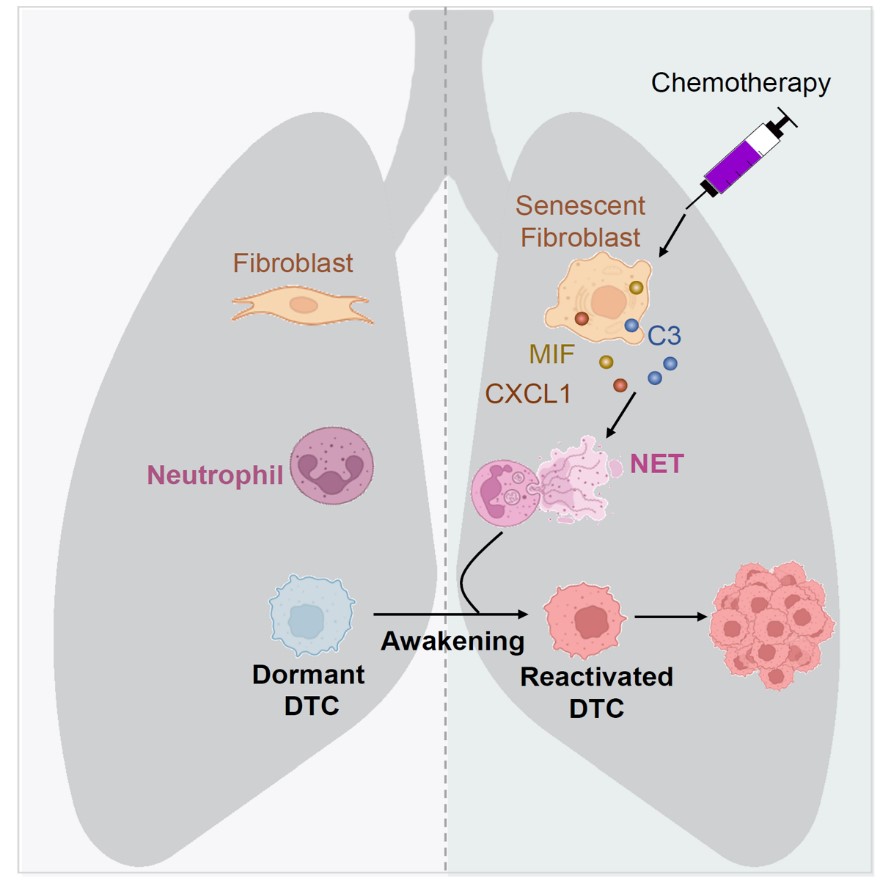- Home >> ALL News >> Highlights
Chinese Scientists Develop a Metastatic Dormancy Lineage Tracing System and Reveal the Effect of Chemotherapy on Dormancy Awakening
Scientists at the Shanghai Institute of Nutrition and Health (SINH) of the Chinese Academy of Sciences developed a novel recombinase-based lineage tracing system, which enables them to directly observe, for the first time, the awakening of disseminated tumor cells (DTCs) after persistent dormancy and investigate the effect of chemotherapeutic drugs during the process.
This work entitled “Chemotherapy awakens dormant cancer cells in lung by inducing neutrophil extracellular traps” was published in Cancer Cell on July 3rd, 2025.
Breast cancer often relapses in distant organs even when complete regression of primary tumors is achieved after initial treatment. Dormant and persistent DTCs have been observed in animals with non-metastatic disease, which cannot be targeted by systemic chemotherapy. It was postulated that the awakening of dormant DTCs in distant organs results in metastatic relapse after the asymptomatic period. However, direct evidence for such awakening was lacking. It was also unclear how exactly chemotherapy might affect DTCs that are already in dormancy.
The research group led by Prof. HU Guohong at SINH designed and established a genetic system, DormTracer, to trace DTC dormancy history using a mutant form of the dormancy marker p27. With this novel tool, researchers provided the evidence of DTC dormancy awakening after chemotherapy which resulted in lung relapse. Researchers also revealed the mechanism driving this awakening, which involves fibroblast senescence and neutrophil extracellular trap (NET) formation. Importantly, this study offered a combination treatment strategy of chemotherapy and senolytic cocktail to counter this detrimental effect of chemotherapy and suppress tumor relapse.
DormTracer represents a useful tool for future investigation into dormancy regulation and intervention. In addition, the study provides an explanation where chemotherapy-induced transition of dormant DTCs to metastatic proliferation responsible for tumor relapse after treatment. Resolution of such side effects of chemotherapy with the senolytic cocktail offers hope to improve therapy efficacy and has led to the launch of a clinical trial.
Scientists and clinicians of Fudan University Shanghai Cancer Center and Qilu Hospital also participated in the work. The study was funded by National Key Research and Development Program of China, National Natural Science Foundation of China, and Youth Innovation Promotion Association of Chinese Academy of Sciences.

Chemotherapy awakens dormant disseminated tumor cells in lung. (Image by Prof. HU Guohong’s group)
Paper link: https://doi.org/10.1016/j.ccell.2025.06.007
Scientific Contact:
Prof. HU Guohong
Shanghai Institute of Nutrition and Health,
Chinese Academy of Sciences
Email: ghhu@sinh.ac.cn
Media Contact:
WANG Jin
Shanghai Institute of Nutrition and Health,
Chinese Academy of Sciences
Email: wangjin01@sinh.ac.cn
Web: http://english.sinh.cas.cn/


